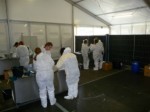Comprehensive oiled wildlife exercises the Netherlands
 As part of a multi-year contract with Rijkswaterstaat, Sea Alarm designed, prepared and facilitated a two-day exercise event, held in October 2013 in ‘s-Gravezande, the Netherlands, which included three field and two table-top exercises.
As part of a multi-year contract with Rijkswaterstaat, Sea Alarm designed, prepared and facilitated a two-day exercise event, held in October 2013 in ‘s-Gravezande, the Netherlands, which included three field and two table-top exercises.
All activity was centered around a facility development exercise in which a 20 x 40 m tent-based rehabilitation facility was put together by Ecoloss, a contractor on a multi-year retainer with Rijkswaterstaat. Ecoloss is responsible for delivering a full -fledged, multifunctional wildlife rehabilitation facility at any given location within 48 hours following an oiled wildlife response mobilization.
The facility that was erected and equipped provided the setting for the oiled bird triage and stabilization exercise, which offered a unique opportunity for Oiled Bird Netherlands (Stichting Olievogelopvang Nederland) members to practice their collective skills.
For this purpose, Sea Alarm’s Claude Velter developed 200 dummies which mimicked both size and health conditions of typical seabird species from the southern North Sea when they are affected by oil. In the realistic set-up of the exercise, the animals arrived in boxes, then had to be examined and approved for treatment, and finally to receive stabilization care according to the principles of herd health management.
A search and collection exercise was carried out on the beach of ‘s-Gravezande, for which the same dummies were used. Teams of two, each with a 4×4 vehicle, had to organize themselves to inspect an 800 m beach transect and collect live and dead birds, using equipment mobilized by Rijkswaterstaat. The “animals” found on the beach were then put on transport vehicles to the facility where they were part of the simulated arrivals.
In one of the table top exercises a first crisis meeting, which involved all the key operators of the Wildlife Response Plan, was simulated. The aim of that meeting is to review all available factual information on the incident, evaluate the situation, and decide upon priority actions for the next 12 and 48 hours. In another table top exercise some issues of facility management were practiced, including record keeping and related resource management.
Both the International Tanker Owners Pollution Federation (ITOPF) and the Flemish Bird Protection League attended the exercise as international observers. ITOPF played its official response role during the crisis management table top exercise.
During the evaluation of the exercise all participants were very positive about the realistic set-up and scenarios, and shared the steep learning curves they had experienced.


